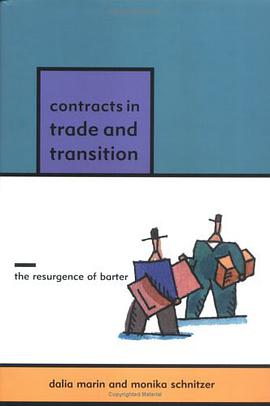

具体描述
Difficulties in contract enforcement impede international transactions in the world economy and domestic transactions in transition economies. In Contracts in Trade and Transition, Dalia Marin and Monika Schnitzer explain how barter as an economic institution can facilitate contract enforcement across national borders in international trade and within borders in transition countries. The authors show that international countertrade--tying an export to an import--emerged in the 1980s in response to the international debt crisis when Western creditors refused to finance imports to developing countries and Eastern Europe. Barter--the exchange of goods without the use of money--reemerged in transition economies in the 1990s in response to a domestic debt crisis when banks in transition countries were reluctant to provide finance to firms. Countertrade and barter introduce a deal-specific form of collateral that addresses the lack of creditworthiness of countries and firms.<br /> <br /> Drawing on contract theory, the authors argue that parties might want to pay in goods rather than cash or link an export with an import as in countertrade to solve incentive problems that otherwise would prevent any trade from taking place. The incentive problems they discuss are the technology transfer problem to developing countries and the "lack of trust" problem in the former Soviet Union.
作者简介
目录信息
读后感
评分
评分
评分
评分
用户评价
这本书在语言风格上的拿捏也值得称道。它成功地在保持学术的严谨性与商业文本的实用性之间找到了一个绝妙的平衡点。如果你期待的是那种晦涩难懂、充斥着拉丁文术语的经典法学著作,这本书可能会让你感到一丝意外,因为它在解释复杂的法律概念时,往往会穿插一些精炼而富有画面感的比喻。比如,在描述合同履约担保机制时,作者使用了一个关于“信任的工程学”的比喻,一下子就把抽象的金融工具具象化了。这种叙事上的灵活性,极大地降低了专业壁垒,使得那些非纯法律背景的贸易经理人也能迅速抓住核心要义。在我看来,一本真正优秀的专业书籍,不应该只服务于圈内人,更应该成为跨界沟通的桥梁。这本书显然朝着这个目标迈进了一大步,它像一位经验丰富的外交官,能用不同听众都能理解的方式,阐述最尖锐的法律分歧点。
评分总而言之,这本书给予读者的价值,远超其作为一本工具书的定位。它更像是一份详尽的、跨越多个法域的风险评估报告和战略规划蓝图。在阅读过程中,我不断地在思考,如果我当初处理某个国际项目时能有这样一本“预警系统”,或许能避开不少不必要的诉讼成本和时间延误。它不只是教你如何起草一份合同,更是教你如何理解驱动合同生效或失效的底层经济和政治力量。对于那些渴望在不确定的全球贸易环境中找到确定性的专业人士来说,这本书提供的不是简单的答案,而是一套更精密的提问框架。它迫使你超越眼前的交易细节,去审视更宏观的制度变迁对商业契约效力的深远影响。这绝对是一本值得反复研读,并在实际工作中随时翻阅的深度著作。
评分这本书的封面设计,那种深邃的蓝色调与烫金的字体,乍一看就给人一种沉甸甸的专业感,仿佛能透过封面直接感受到它所蕴含的复杂法律条文与商业智慧。我拿到手的时候,首先关注的是它的排版和装帧质量,毕竟涉及“贸易”和“过渡时期”这种宏大主题的书籍,如果内容密度过大而排版又过于拥挤,阅读体验必然会大打折扣。幸运的是,这本似乎在这方面做得相当到位,字体大小适中,段落之间的留白恰到好处,这对于需要反复查阅或深入研读的专业书籍来说至关重要。我期待它能用一种既严谨又不失流畅性的笔触,带领读者穿梭于不同司法管辖区和经济转型的复杂地带,揭示那些隐藏在标准合同条款背后的微妙平衡与潜在陷阱。尤其是在全球化背景下,跨国交易的不可预测性日益增加,一本能系统梳理这些风险并提供实用应对策略的著作,无疑是法律从业者和国际商务人士案头必备的指南。那种翻阅时纸张带来的轻微摩擦声,也平添了几分沉浸感,让人愿意静下心来,细细品味其中每一个论断。
评分初读几章,我立刻被作者对“过渡时期”这一概念的界定和剖析所吸引。这不仅仅是指冷战后的地缘政治变迁,更是深入到新兴市场经济体在法律框架重塑过程中的动态张力。我发现作者在处理案例时,并没有采取那种教科书式的、非黑即白的分析方法,而是充满了对现实操作中灰色地带的深刻洞察。例如,在讨论关于“不可抗力”在能源合同中的适用性时,作者引用了几个非常新颖的国际仲裁判例,这些判例明显反映出各国法院在面对突发公共卫生事件或极端气候变化时的态度演变。这种对法律思想前沿的紧密追踪,使得这本书的知识密度极高,你不能指望囫囵吞枣地读完,每一页都需要停下来,反思自己的过往经验是否能与之印证,或者是否有新的视角可以被激发出来。对于那些希望跳出本土化思维定势,真正理解全球商业契约“活的生命力”的读者来说,这本书提供了一个绝佳的深度观察窗口。
评分这本书的结构编排,尤其是在处理不同贸易工具和不同法律体系的交叉对比时,展现出高超的组织能力。我特别欣赏它如何系统地梳理了从传统的跟单信用证(L/C)到近年来兴起的数字资产担保交易(Digital Asset Security)在不同“过渡期”国家的法律接受程度和实际操作风险。作者似乎在构建一个多维度的矩阵,横轴是商业工具的演变,纵轴是法律环境的变迁。当你翻到关于知识产权许可协议的部分时,你会发现它并没有简单地罗列各国法律,而是聚焦于那些在技术转移过程中,因监管环境突然变化而导致价值重估的典型场景。这种聚焦于“变”与“不变”的对比分析方法,使得书中的内容具有极强的生命力,它不是在描述一个静止的法律状态,而是在捕捉一场持续的、动态的博弈过程。这种深度的结构化思考,是普通参考手册所无法比拟的。
评分 评分 评分 评分 评分相关图书
本站所有内容均为互联网搜索引擎提供的公开搜索信息,本站不存储任何数据与内容,任何内容与数据均与本站无关,如有需要请联系相关搜索引擎包括但不限于百度,google,bing,sogou 等
© 2026 book.wenda123.org All Rights Reserved. 图书目录大全 版权所有




















